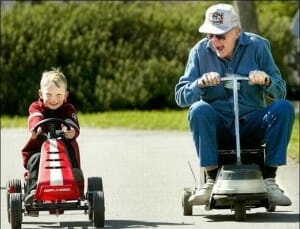“Age, ain’t nothing but a number”
In a recent article in the Wall Street Journal entitled “Why Everything You Think About Aging Maybe Wrong,” staff reporter Ann Tergensen reveals a number of myths and misconceptions about getting older. She states that “as we get older, friendships, creativity and satisfaction with life can flourish.”
I appreciate how she challenges conventional thinking from the very beginning of the article. She generalizes, “Everyone knows that with age… life inevitably becomes less satisfying and enjoyable… that cognitive decline is inevitable… and that we become less productive at work…Everyone, it seems, is wrong.” She also challenges the stereotype of growing older as a time of loneliness, depression and decline; because, as she points out, there’s more and more research that shows life can actually get better in many ways as we age.
Truthfully, as an advocate and promoter for embracing aging for Messiah Lifeways, I do have my own personal anxiety about getting older and maintain a small amount of skepticism about articles such as Ms. Tergensen’s. However, each year that goes by, as I interact with more and more vibrant and gratified seniors, and discover research that supports aging as a time of opportunity and contentment, my anxiety and skepticism wane. Likewise, my fear and reluctance about aging are evolving into appreciation and acceptance. The journey of aging that I encourage others to embrace is one that I’m learning as I go as well.
She goes on to say that growing older does have its challenges and takes its toll on our physical and mental health. But the “stereotype of being depressed, cranky, irritable and obsessed with their ailments, constitute “no more than 10% of the older population” as stated by Paul Costa, a scientist emeritus at the National Institute of Health. Furthermore, an article I wrote a while back entitled, “Ageism and Karma,” I stated that you can assign stereotypes to every generation, and while they may be true, they are often grossly exaggerated generalizations.
The WSJ article continues on by debunking 6 myths about aging.
Myth #1: Depression Is More Prevalent in Old Age – Despite the assumption that aging and depression go hand-in-hand, a 10 year study from Stanford University refutes that myth. It included 184 participants ages 18 to 94 reporting on their emotions over this 10 year period. They found that participants’ moods, which were measured by the ratio of positive to negative emotions, steadily improved with age.
Myth #2: Cognitive Decline Is Inevitable – As we age, our concentration and memory does begin to slip, which actually starts around age 30, and I can attest to that. However, barring dementia, a study from the University of Toronto indicates that older adults performed better in real world situations versus cognitive tests because of acquired knowledge and life experiences. And much like any other muscle in the body, exercising and challenging our brains is essential to combat mental decline.
Myth #3: Older Workers Are Less Productive – a vast majority of academic studies shows “virtually no relationship between age and job performance,” says Harvey Stearns, director of the Institute for Life-Span Development and Gerontology at the University of Akron. It’s also noted that in jobs that require experience, some studies showed that older adults have a performance edge and that older workers seem better at avoiding severe errors.
Myth #4: Loneliness Is More Likely – though true that social circles do get smaller as you age, several studies indicate that the friendships that you do have typically improve with age. Also they tend to have better marriages, more supportive friendships, less conflict with family, and closer ties with members of their social network versus younger adults.
Myth #5: Creativity Declines with Age – academic studies and historical figures have shown that artists and scholars may reach their peak output when they are in their 60s according to Dean Keith Simonton, a professor of psychology at the University of California Davis. He also adds that “experimental artists” improve with time and experience and take years to perfect their style and knowledge and that wisdom does increase with age.
Myth #6: More Exercise Is Better – James O’Keefe, a professor of medicine at the University of Missouri, states that with exercise as you age there is a point of diminishing returns. Therefore, moderate workout routines are sufficient, and long-term strenuous endurance exercise can cause “overuse injury” to the heart.
In conclusion, I think the article challenges traditional thinking and opens your eyes about aging by backing it up with data and research. However, it is important to focus on a particular fragment within this commentary – and it’s the word “can.” As stated earlier in the article “as we get older…life can flourish,” but it hinges on your individual attitude and outlook on aging. For the parts of aging we control, if you let it, loneliness, depression and decline will bring you down. But if you take control and find meaning and purpose and embrace aging, you can flourish.
To learn more about how you can change the conversation and flourish as you age, contact the Messiah Lifeways Coaching Program at 717.591.7225 or coach@messiahlifeways.org.





